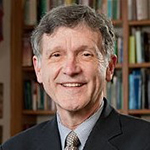By Bill Leonard
 Gardner C. Taylor died on Easter Sunday 2015. Those who knew him weren’t surprised that as one friend said, “he held on till Easter.” Taylor, a spiritual icon inside and beyond the African-American community, was civil rights leader, author, lecturer, and 42 years pastor of Concord Baptist Church, New York City. In 1961, he joined L. V. Booth, Martin Luther King Jr. and others in forming the Progressive National Baptist Convention. Bill Clinton presented him with the Presidential Medal of Freedom in 2000. To his dying day at age 96, Dr. Taylor identified himself as simply a preacher of the gospel. That wasn’t what he did; it was who he was. In “How Shall They Preach” (1975), his Lyman Beecher Lectures at Yale Divinity School, Taylor wrote:
Gardner C. Taylor died on Easter Sunday 2015. Those who knew him weren’t surprised that as one friend said, “he held on till Easter.” Taylor, a spiritual icon inside and beyond the African-American community, was civil rights leader, author, lecturer, and 42 years pastor of Concord Baptist Church, New York City. In 1961, he joined L. V. Booth, Martin Luther King Jr. and others in forming the Progressive National Baptist Convention. Bill Clinton presented him with the Presidential Medal of Freedom in 2000. To his dying day at age 96, Dr. Taylor identified himself as simply a preacher of the gospel. That wasn’t what he did; it was who he was. In “How Shall They Preach” (1975), his Lyman Beecher Lectures at Yale Divinity School, Taylor wrote:
“How strange of God to make the uttered word, so fragile and so tenuous, the principal carrier of so precious a cargo as that incalculable love which He has intemporated [Dr. Taylor made up wonderful words] and incarnated in Jesus Christ our Lord. Paul apparently shared such misgivings, for he cries out in Corinthians, ‘It pleased God by the foolishness of preaching to save them that believe.’ So! The wisdom of God in choosing the way of preaching is set against the modesty we have about the undertaking and which comes of our limited gifts in the proclamation of the Gospel. It may be, also, that God’s wisdom in this matter is set against our conceit that leads us to believe we could have found a better way to amplify and communicate the Saving Deed in Christ.”
I first heard Gardner Taylor preach when he came to the Baptist seminary in Louisville where I was a young professor. Like everyone else in the packed chapel, I was mesmerized by the content of his sermon and the sturdy cadence of his amazing voice. Years later, after retiring to North Carolina he preached on several occasions at Wake Forest University School of Divinity. The last time, well on his way to 90, he quoted most of the Declaration of Independence from memory. Once again, the crowd was mesmerized.
Near the conclusion of his Beecher Lectures Taylor summed up the preacher’s task: “We are surrogates of a Gospel which has explored the secret places of the human heart, which has sounded the depths of the human predicament.” The term “Surrogates of the Gospel” offers a profound image for describing the link between the “foolishness” of preaching and the struggle to touch “the secret places of the human heart.”
Dr. Taylor’s death was heavy on my own heart when I returned to Boston University, where I received a PhD 40 years ago this May, to preach at Easter Week chapel. On the way to benediction, I suddenly realized that after a 40-year absence, BU’s historic Marsh Chapel was for me full of ghosts, memories of teachers, friends and distant mentors whose voices had sounded in that place across decades. Persons like historical theologian Edwin Prince Booth, whose sermons on Martin Luther and Francis of Assisi delivered at Texas Wesleyan College my junior year started me thinking about study at Boston University; or Howard Thurman, American mystic and dean of Marsh Chapel; or Walter Muelder, Methodist ethicist and teacher of Martin Luther King, or my friend and late ethics professor Prathia Hall; or BU graduate and master preacher Samuel DeWitt Proctor.
Proctor is the subject of a new book by Adam L. Bond entitled The Imposing Preacher: Samuel Dewitt Proctor and Black Public Faith, an excellent study of another legendary African-American pulpiteer, and pastor of New York’s great Abyssinian Baptist Church. Proctor died in 1997 and the school of theology at Virginia Union University bears his name. Like Gardner Taylor, Proctor was a “surrogate” for Gospel freedom and justice in the church and the public square. His words in a 1981 sermon are hauntingly relevant 35 years later.
“If the state must be preoccupied with defense, then we [Christians] should be preoccupied with peace. . . . If the state is preoccupied with more jails, we should be preoccupied with changing lives from within. If the state is busy giving tests to prove that some students can’t learn, we should be busy seeing to it that they are taught and that they do learn. We should be the conscience of the state, not its echo, not its sycophant, not its honor guard.”
Proctor’s continuing impact came home to me recently while giving the Currie Lectures at First Presbyterian Church, Kerrville, Texas. A church member, who happens to be white, told me that for years she had never understood why the early apostles would have “dropped everything” to follow the unknown Nazarene Rabbi when he summoned them by the lakeshore. Then she happened to hear Samuel DeWitt Proctor at a preaching conference, and confessed, “by the third sermon I would have followed him anywhere!” After that, she says, “I knew exactly why those fishermen ‘left their nets’ when Jesus called.”
Foolishness? Of course. Thank God.
